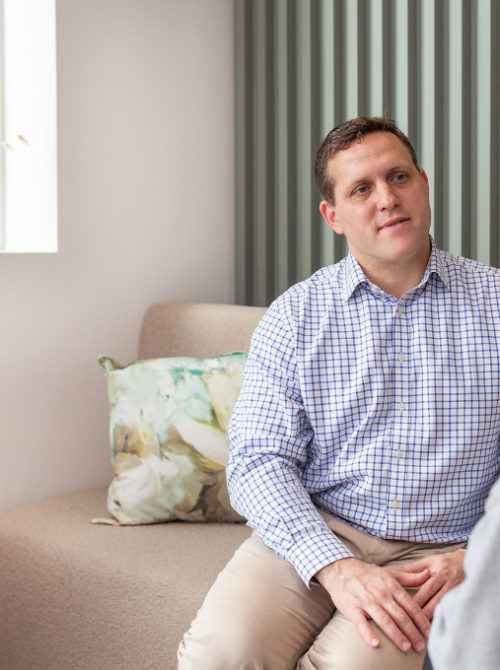When to Consider Egg Freezing
At The Evewell, we support individuals and couples in making informed decisions about fertility preservation. This process always begins with understanding your fertility health, discussing your goals, and exploring whether egg freezing is right for you.
By Rebecca Hay, Head of Patient Services Operations
For many people, the decision of when to start a family is not straightforward. Career, relationships, health, and personal circumstances can all influence the timing. Egg freezing is an option that allows you to preserve your fertility for the future, giving you more flexibility and choice over when to start your family.
Step 1: Understanding your fertility health
Before recommending egg freezing, we always carry out a comprehensive fertility review. This assessment is available for individuals and couples, including same-sex couples and single patients, and it provides the information needed to make confident decisions.
A fertility review includes:
- An internal ultrasound scan – to examine the ovaries and count the number of visible follicles. Follicles are not eggs themselves but are fluid-filled sacs that have the potential to release an egg during ovulation. The number of follicles gives us an important indicator of your ovarian reserve.
- An AMH blood test – AMH (Anti-Müllerian Hormone) levels are another key measure of ovarian reserve. Together with the follicle count, this helps us estimate how many eggs you might have available now and in the future.
- Semen analysis (where relevant) – for couples, semen analysis looks at sperm count, movement, and shape. When combined with egg reserve results, this gives us a complete picture of fertility potential as a couple.
One of the most valuable parts of this review is the consultation with a fertility specialist. Results can feel complex and overwhelming if you are trying to interpret them on your own, especially with home testing kits. At The Evewell, your doctor will take time to explain exactly what your results mean for you and how they connect to your future family goals.
Step 2: Talking about your goals
Fertility is not just about numbers — it’s about your personal circumstances, hopes, and plans. That’s why one of the most important conversations we have during your consultation is about your goals.
Your doctor may ask:
- Do you want to start a family soon, or are you hoping to wait several years?
- Are you thinking about having one child, or would you like to plan for a larger family?
- Are you making these decisions alone, with a partner, or are you considering using donor sperm?
Your answers will shape whether egg freezing is the most appropriate option. For some, embryo freezing with a partner’s or donor sperm may be recommended. For others, a combination of both eggs and embryos can provide the greatest flexibility.
Step 3: Situations where egg freezing may be recommended
There are several scenarios where egg freezing could be worth considering:
1. Delaying parenthood
If you’re not ready to have children now but would like the option in the future, egg freezing can be a way of preserving fertility. Freezing eggs in your late 20s or early 30s is often recommended, as younger eggs typically have a higher chance of leading to a healthy pregnancy later.
2. Planning for a larger family
Some patients are ready to start trying for a child now but also hope to have multiple children in the future. While conceiving your first child may be straightforward, age-related fertility decline can make later pregnancies more difficult. Freezing eggs earlier gives you options for your second, third, or fourth child later in life.
3. Medical or personal reasons
Egg freezing is also an important option for people who may undergo treatments that could affect fertility, such as chemotherapy or certain types of surgery. It is also relevant for transgender patients planning a medical transition who want to preserve their fertility before starting treatment.
Step 4: How your results influence recommendations
Your doctor will always combine your fertility test results with your goals to make a recommendation. For example:
- If you are in your late 20s, with good ovarian reserve, and want to delay starting a family for five or more years, egg freezing could be a strong option.
- If you hope to have a larger family, egg freezing may be suggested even if you’re about to begin trying for your first child, to help safeguard future pregnancies.
- If your results are strong and you’re ready to try soon, your doctor may reassure you that egg freezing isn’t necessary at this stage.
This personalised approach ensures that you are not only making decisions based on clinical results but also on your life circumstances and goals.
Step 5: Preserving your options for the future
It’s important to be clear that egg freezing is not an insurance policy or a guarantee of a future pregnancy. However, younger eggs generally have a higher chance of resulting in a healthy pregnancy. By freezing your eggs now, you are effectively preserving your current fertility, giving yourself more choices later in life.
This can bring peace of mind — knowing that, whatever life brings, you have taken steps to keep options open for yourself and your future family.
Final thoughts
Egg freezing is not the right choice for everyone, but for many people it can be an empowering step towards preserving future fertility. Whether you are delaying parenthood, planning for a larger family, or facing medical treatment, it offers flexibility and reassurance.
At The Evewell, we take the time to help you understand your fertility health, talk through your goals, and create a personalised plan. Our aim is to support you in making decisions that feel right for you — both now and in the future.





